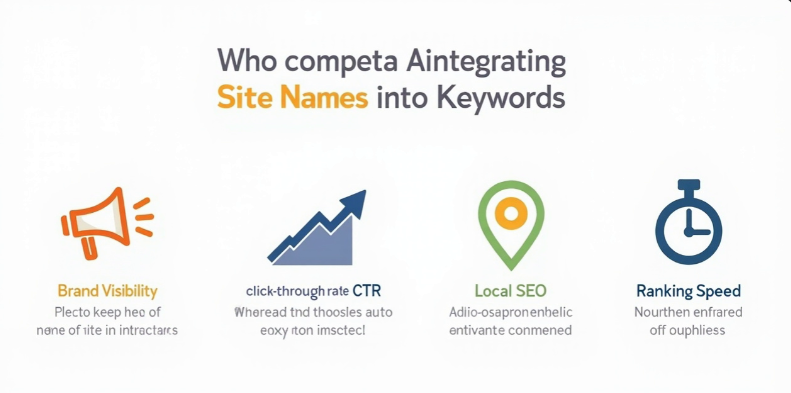
When optimizing your website for search engines, choosing the right keywords is essential. But should you include your site name in those keywords? This question is particularly relevant for small businesses, local websites, and new brands looking to establish their online presence. For example, at HQLinkers, we often explore strategies to boost visibility, and this topic is a key consideration. Understanding the pros and cons of this strategy, as well as best practices, can help you craft an effective SEO plan. Let’s break down the details.
Benefits of Using Your Site Name in Keywords
Including your site name in SEO keywords can offer several advantages, especially for businesses with some brand recognition. Here are the key benefits:
- Increased Brand Visibility and Recognition
When your site name appears in search results, it reinforces your brand identity. Users are more likely to trust and click on a result that includes a familiar name, especially for established brands. For instance, a search for “HQLinkers SEO tips” could strengthen your brand’s presence on HQLinkers. - Higher Click-Through Rates (CTR)
Research suggests that users are more likely to click on search results with recognizable brand names. A Nielsen study found that 59% of users prefer familiar brands, which can improve your CTR—a key ranking factor for search engines. - Local SEO Advantages
For local businesses, incorporating your site name (especially if it includes your location) can help customers find you more easily. This is particularly useful for small-scale or new websites targeting a specific geographic area, such as “HQLinkers digital marketing in [City].” - Faster Ranking for Branded Keywords
Branded keywords often face less competition than generic terms, making it easier for your site to rank higher for searches that include your site name. This can lead to quicker visibility for terms directly related to your brand, as noted in XSquareSEO’s analysis.
| Benefit | Description | Example |
|---|---|---|
| Brand Visibility | Reinforces brand identity in search results | “HQLinkers SEO services” |
| Higher CTR | Familiar names attract more clicks | 59% prefer familiar brands |
| Local SEO | Helps local customers find your business | HQLinkers |
| Faster Ranking | Less competition for branded terms | Quick ranking for “HQLinkers blog” |

Drawbacks of Using Your Site Name in Keywords
While there are benefits, there are also potential downsides to consider when using your site name in SEO keywords:
- Limited Reach to New Customers
Focusing on branded keywords might exclude users who are not already familiar with your brand. New customers often search for generic terms related to your products or services, not your specific site name. For example, someone searching for “SEO services” may not find HQLinkers if you only target “HQLinkers SEO services.” - Risk of Over-Optimization
Overusing your site name in keywords can lead to over-optimization, which search engines may penalize. It’s important to use your site name naturally and strategically to avoid this issue. - Potential Misalignment with User Intent
Not all users include brand names in their search queries. If your keywords are too focused on your site name, you might miss out on ranking for relevant non-branded searches, reducing your visibility for broader terms. - Keyword Cannibalization
If multiple pages on your site target similar branded keywords, they may compete with each other for the same search terms, reducing their individual ranking potential. This is a concern raised in FlyRank’s guide.
| Drawback | Description | Example Issue |
|---|---|---|
| Limited Reach | Misses new customers searching generic terms | “SEO services” vs. “HQLinkers SEO services” |
| Over-Optimization | Risk of penalties for unnatural keyword use | Overusing “HQLinkers” in content |
| Misalignment | Keywords not matching user search intent | Users searching “best SEO tips” |
| Cannibalization | Pages competing for same branded terms | Multiple pages targeting “HQLinkers blog” |

Best Practices for Incorporating Your Site Name in SEO Keywords
To make the most of this strategy, follow these best practices based on expert insights:
- Use Strategically for Branded Searches
Target your site name in keywords for searches where users are specifically looking for your brand, such as “[HQLinkers] reviews” or “[HQLinkers] contact.” This is particularly effective for pages like your homepage or about page. - Balance with Non-Branded Keywords
Don’t rely solely on branded keywords. Include non-branded terms to attract a broader audience. For example, combine “HQLinkers digital marketing” with “digital marketing for small businesses” to reach both existing and potential new customers. For more on keyword selection, check out related posts on HQLinkers’ blog. - Include in Meta Tags and Specific Pages
Use your site name in meta titles and descriptions for key pages like your homepage, about page, or product pages. For example, a meta title could be: “Top SEO Services from HQLinkers – Boost Your Rankings.” This reinforces your brand while providing clear information to search engines and users, as recommended by Yoast. - Monitor Performance and Adjust
Use tools like Google Analytics and Search Console to track how your keywords perform. Adjust your strategy based on data to ensure you’re targeting the most effective terms. This aligns with advice from FlyRank.
The Role of Domain Names in SEO
Your domain name is often the first thing users see, and it can play a role in SEO. Including relevant keywords in your domain name (e.g., “bestbakeryinnewyork.com”) can improve click-through rates and rankings, especially for local searches. However, it’s important to balance this with branding. A domain like “hqlinkers.com” is memorable and brandable, while a keyword-heavy domain might seem less professional. A study cited by Manobyte suggests that domains with keywords can improve click-through rates, but exact match domains (EMDs) should be used cautiously to avoid appearing over-optimized.
| Domain Strategy | Pros | Cons |
|---|---|---|
| Keyword + Brand (e.g., “seohqlinkers.com”) | Improves CTR, SEO-friendly | May seem less brandable |
| Brand Only (e.g., “hqlinkers.com”) | Memorable, professional | Less keyword-specific |
| Exact Match Domain (e.g., “bestseo.com”) | Strong initial ranking | Risk of over-optimization |
Internal Link Suggestion: If available, link to a post on “Local SEO Strategies” in this section to connect domain name choices with local SEO benefits.
Case Studies and Examples
One notable example comes from a study on generic domain names, which found that ads using a domain like “DivorceLawyer.com” had a 298% higher click-through rate compared to a non-keyword domain like “VladimirLaw.com.” This highlights the potential power of having relevant keywords in your domain name. However, for content SEO, it’s crucial to back up your domain with high-quality, relevant content that meets user needs. For HQLinkers, combining a strong domain with targeted content can maximize SEO impact.
People Also Ask and Related Searches
Based on insights from top-ranking websites, here are answers to common related questions:
- How does using a site name in keywords affect page titles?
Including your site name in page titles can improve brand recognition and CTR, but ensure the title reflects the page’s content and target keywords, as advised by Yoast. - Should I include my site name in URLs for SEO?
Keywords in URLs can help, but avoid overstuffing. A structure like “hqlinkers.com/seo-services” is effective without risking penalties, per The SEO Works. - How do site names appear in Google search results?
Google displays site names automatically based on your site’s homepage and web references, as explained in Google’s documentation. - What are the best keywords to use for SEO?
The best keywords align with user intent, have sufficient search volume, and match your content’s focus. Tools like Google Keyword Planner can help, as noted in Moz’s guide.
Final Thoughts
SEO is an ongoing process that requires regular monitoring and adaptation. Use tools like Google Analytics and Search Console to track your keyword performance and stay updated with the latest SEO trends. By balancing branded and non-branded keywords and focusing on high-quality content, you can ensure your website remains visible and relevant in the ever-changing digital landscape. For more SEO tips, explore related posts on HQLinkers’ blog.



